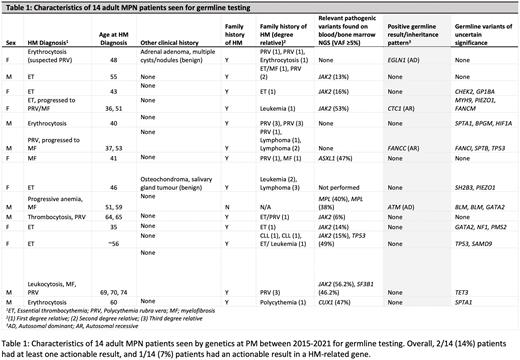Abstract
Hereditary hematologic malignancies (HMs) are caused by germline variants that may be shared between multiple family members. Genetic testing and counseling in this cohort can provide surveillance for at-risk family members, screen potential bone marrow donors and inform therapeutic decision-making. In contrast to defined syndromes that predispose individuals to acute leukemia, the hereditary nature of myeloproliferative neoplasms (MPNs) remains understudied and is often ignored in hereditary hematology workup. MPNs, including essential thrombocythemia (ET), polycythemia rubra vera (PRV), primary myelofibrosis (PMF), chronic myelomonocytic leukemia (CMML) and hereditary erythrocytosis/thrombocytosis, often present sporadically in patients with no family history. However, at least 7.6% of all patients with apparently sporadic myeloproliferative disorders are reported to have a family history of MPN.
MPNs are commonly associated with somatic mutations in driver genes JAK2, CALR, and MPL. While no single-gene familial MPN has been formally defined, germline pathogenic variants in these driver genes have been reported in some families. Additionally, variants in EGLN1/EPAS1 and duplications of the 14q32.2 genomic region have been described in multiple cases of familial MPNs. Finally ETV6 and SH2B3, genes classically associated with other inherited myeloid and lymphoid HMs, have some overlap with MPN presentation. Overall, familial clustering of MPNs has been observed in small case and large cohort studies, with a higher incidence of MPNs in first-degree relatives (FDRs) of affected patients.
The Princess Margaret Cancer Centre (PM) is the largest leukemia center in Canada and has seen over 3000 adult patients with a HM between 2015-2021, including 664 patients diagnosed with a MPN. Here, we present our single-center experience in a small cohort of adult MPN patients referred during this period for hereditary hematology workup. Germline testing is primarily based on family history or suspicious findings on blood/bone marrow next generation sequencing (NGS), but testing may also be initiated based on recent literature and team discussion. Germline analysis was performed on DNA extracted from skin fibroblasts according to our genetic testing workflow. Since hereditary MPN testing is not fully characterized and some MPN genes have overlap with other HMs, testing was performed on genes related to erythrocytosis, inherited bone marrow failure syndromes, and/or myeloid malignancies, with recent patients receiving a panel comprehensive of all three.
A total of 14 patients (7 male, 7 female; age range 35-74y, median 46y) diagnosed with a MPN (5 ET, 3 MF, 2 PRV, 3 erythrocytosis, 1 PRV/MF,) were referred to genetics for germline analysis (Table 1). 13/14 (93%) patients were referred with a positive family history of HM: 10/14 (71%) had at least one FDR with a HM, nine of whom had at least one FDR with a shared clinical presentation. Three patients only had a second or third degree family history of HM, and one patient had no family history of HM. Out of seven patients with a JAK2 mutation on blood/bone marrow, none were germline. On average, the time between MPN diagnosis and referral to genetics was six years (range 0-18 years).
Overall, 2/14 (14%) patients referred had at least one actionable result, where actionability is defined by the presence of a pathogenic variant in any gene associated with an increased cancer risk. Of these two positive cases, only one (7% of all referrals) occurred in a gene associated with HMs: EGLN1. This patient was diagnosed with EGLN1-familial erythrocytosis. A second patient with no family history who was tested due to biallelic MPL mutations seen on blood/bone marrow NGS was found to be positive for ATM, a gene associated with other hereditary cancer syndromes. In addition, 2/14 (14%) patients had incidental findings associated with carrier status for an autosomal recessive disorder. 10/14 (71%) patients were found to have at least one variant of uncertain significance.
Notably, while we saw strong familial patterns in MPN families, germline testing did not always detect a hereditary component; 8/9 patients with a first-degree family history of MPN had no actionable variants. While the hereditary nature of MPNs should be considered in clinical analysis, larger cohort studies are needed to determine stronger clinical markers of germline inheritance.
Disclosures
Yee:Novartis: Consultancy, Honoraria, Research Funding; Astex: Research Funding; Gilead: Research Funding; Jazz: Consultancy, Research Funding; GlaxoSmithKline: Consultancy; Shattuck Labs: Consultancy; TaiHo: Consultancy; Abbvie: Honoraria; Karyopharm: Research Funding; Takeda: Consultancy; F. Hoffmann La Roche: Consultancy, Research Funding; Geron: Research Funding; Treadwell: Research Funding; Janssen: Research Funding; Forma Therapeutics: Research Funding; Astellas: Consultancy; Bristol-Myers Squibb/Celgene: Consultancy; Pfizer: Consultancy.
Author notes
Asterisk with author names denotes non-ASH members.


This feature is available to Subscribers Only
Sign In or Create an Account Close Modal